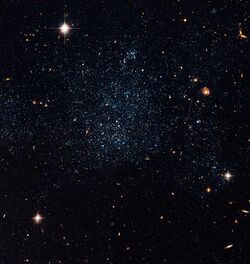Astronomy:Holmberg IX
From HandWiki
| Holmberg IX | |
|---|---|
 Hubble Space Telescope image of the dwarf irregular galaxy Holmberg IX | |
| Observation data (J2000 epoch) | |
| Constellation | Ursa Major |
| Right ascension | 09h 57m 32.1s[1] |
| Declination | +69° 02′ 46″[1] |
| Distance | 12 Mly (3.6 Mpc)[2] |
| Apparent magnitude (V) | 16.5[1] |
| Characteristics | |
| Type | dI[1] |
| Apparent size (V) | 1.41 ± 0.07[1] |
| Notable features | Satellite galaxy of Messier 81 |
| Other designations | |
| UGC 5336, [B93] 17, DDO 66, 2E 0953.7+6918, 2E 2199, 1ES 0953+69.3, HIJASS J0957+69A, Holmberg IX, [IW2001] H42, [IW2001] P63, K68 62, LEDA 28757, Mailyan 48, MCG+12-10-012, [MI94] Im 62, SPB 118, PGC 28757 | |
Holmberg IX is a dwarf irregular galaxy and a satellite galaxy of M81, located in the constellation of Ursa Major. It is a Magellanic type galaxy, similar to the Small Magellanic Cloud, neighbour galaxy to the Milky Way Galaxy.[3] The galaxy is named after Erik Holmberg who first described it, though it was originally discovered by Sidney van den Bergh in 1959.[4][3] Based on the observed age distribution of stars it contains, 20% of its stellar mass formed within the last 200 Myr, making it the youngest nearby galaxy.[5] It is also home to one of two yellow supergiant eclipsing binary systems.[6][7]
References
- ↑ 1.0 1.1 1.2 1.3 1.4 "UGC 5336". SIMBAD. Centre de données astronomiques de Strasbourg. http://simbad.u-strasbg.fr/simbad/sim-basic?Ident=UGC+5336.
- ↑ Prieto, J. L. (January 2008). "LBT Discovery of a Yellow Supergiant Eclipsing Binary in the Dwarf Galaxy Holmberg IX". The Astrophysical Journal 673 (1): L59–L62. doi:10.1086/527415. Bibcode: 2008ApJ...673L..59P.
- ↑ 3.0 3.1 "Holmberg IX news from Hubblesite". 8 January 2008. https://hubblesite.org/contents/media/images/2008/02/2236-Image.html.
- ↑ Van Den Bergh, Sidney (1959). "A Catalogue of Dwarf Galaxies". Publications of the David Dunlap Observatory 2 (5): 147. Bibcode: 1959PDDO....2..147V.
- ↑ Sabbi, E.; Gallagher, J. S.; Smith, L. J.; de Mello, D. F.; Mountain, M. (March 2006). "Holmberg IX: The Nearest Young Galaxy". The Astrophysical Journal 676 (2): L113–L117. doi:10.1086/587548. Bibcode: 2008ApJ...676L.113S.
- ↑ "Two new Star Systems are the First of Their kind Ever Found". Archived from the original on 2008-04-02. https://web.archive.org/web/20080402133205/http://researchnews.osu.edu/archive/superyellow.htm.
- ↑ "Two Yellow Supergiant Eclipsing Binary Systems Discovered: First Of Their Kind Ever Found". Science Daily. 2008-04-01. https://www.sciencedaily.com/releases/2008/03/080331135542.htm.
Further reading
- Winter, Lisa M.; Mushotzky, Richard F.; Reynolds, Christopher S. (2007). "Elemental Abundances of Nearby Galaxies through High Signal-to-Noise Ratio XMM-Newton Observations of Ultraluminous X-Ray Sources". The Astrophysical Journal 655 (1): 163–178. doi:10.1086/510200. Bibcode: 2007ApJ...655..163W.
- Fabien, Grisé; Pakull, Manfred W.; Motch, Christian (2006-05-12). "The Ultraluminous X-ray Source in Holmberg IX and its Environment". Proceedings of the International Astronomical Union 1 (S230): 302–303. doi:10.1017/S1743921306008519. Bibcode: 2006IAUS..230..302G.
- Makarova, L.; Grebel, E. K.; Karachentsev, I. D.; Dolphin, A. E.; Karachentseva, V. E.; Sharina, M. E.; Geisler, D.; Guhathakurta, P. et al. (2002). "Tidal dwarfs in the M81 group: the second generation?". Astronomy and Astrophysics 396 (2): 473–487. doi:10.1051/0004-6361:20021426. Bibcode: 2002A&A...396..473M.
- Schulte-Ladbeck, R. E.; Hopp, U. (1987). "The Dwarf Irregular Galaxy Holmberg IX". Mitteilungen der Astronomischen Gesellschaft 70: 427. Bibcode: 1987MitAG..70..427S.
- Bertola, F.; Maffei, P. (1974). "Two Faint Companions to M81". Astronomy and Astrophysics 32: 117. Bibcode: 1974A&A....32..117B.
- Holmberg, E. (1969). "A study of physical groups of galaxies". Arkiv för Astronomi 5: 305–343. Bibcode: 1969ArA.....5..305H.
- van den Bergh, Sidney (1959). "A catalogue of dwarf galaxies". Publications of the David Dunlap Observatory (University of Toronto) 2 (5): 147. Bibcode: 1959PDDO....2..147V.
External links
- M81's satellite galaxy Holmberg IX
- Holmberg IX: XMM1
- GALEX Completes Four Star-Studded Years in Space
- Dwarf Galaxy Holmberg IX
- Holmberg IX on WikiSky: DSS2, SDSS, GALEX, IRAS, Hydrogen α, X-Ray, Astrophoto, Sky Map, Articles and images
Coordinates: ![]() 09h 57m 32.1s, +69° 02′ 46″
09h 57m 32.1s, +69° 02′ 46″
 |
